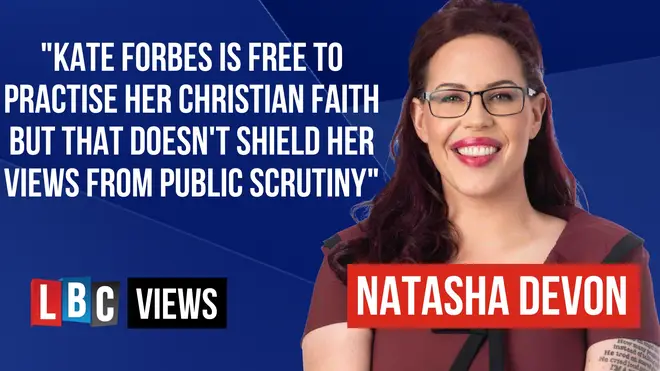
Nick Abbot 10pm - 1am
27 February 2023, 14:40 | Updated: 2 March 2023, 16:32

Kate Forbes, current Finance Minister of the SNP who is in the running to be the next leader of the party, sparked controversy last week.
As a member of the ultra-conservative Free Church of Scotland, Forbes said during an interview that she believes having a child outside of marriage is ‘wrong’. She also said that, had she been an MSP in 2014, she would have voted against equal marriage for people in same-gender relationships.
Much has been made of Forbes’ promise that, were she to become leader, she wouldn’t seek to impose her beliefs on the people of Scotland. That, while reassuring, isn’t enough to abate my fears as a member of the LGBTQ community. As Suella Braverman’s despicable words about asylum seekers and the subsequent hatred and violence towards them demonstrates, it is not just the actions of politicians, but their words that have consequences.
The whole ‘hate the sin love the sinner’ thing is, in my opinion, (very) thinly veiled queerphobia. It still has the power to embolden those who wish LGBTQ people harm and to kibosh attempts to promote tolerance and inclusion. The number of homophobic hate crime reports in the UK has doubled during the past five years, while incidents of violence against trans people have tripled. It is therefore unsurprising that many of us are concerned at the prospect of someone having the platform that being First Minister of Scotland provides saying that our orientations are inherently sinful.
None of this should prevent Kate Forbes from running in the leadership race. However, Scottish people should also be wary of allowing themselves to buy into the idea that they should ignore her views (which, if they weren’t cushioned within the framework of religion would simply be called bigotry) because she’ll perform well on the things ‘they people really care about’, like the economy.
As history will attest, that’s how fascism happens: We’re told not to worry about ‘tiny minorities’ because this leader will get to the ‘real’ issues of how much money is in the pockets of ‘ordinary people’. It’s divisive rhetoric, which often sees non-white and LGBTQ people (also ‘ordinary people’ for the record) thrown under the bus.
Critics of Forbes have been variously accused of being ‘anti freedom of speech’ and even ‘Christianophobes’ by her supporters.
These responses missed several crucial points.
The first, and perhaps the most important, being that not all Christians hold Forbes’ stance on marriage. Religious scholars have written at length about how the Bible, being as it has translated several times, is open to interpretation and should be understood in its historical context. As a result, many Christian denominations renounce the homophobia and misogyny within its pages. It is eminently possible to do this while still being faithful to the teachings of Jesus, who never mentioned homosexuality and was actively supportive of women who lived unconventional lives.
Secondly, just as we cannot speak of Christians as though they are a monolith, similarly not all political parties are the same.
As I understand it, the SNP is a progressive organisation which promotes liberal social values. It is therefore not at all at odds with ‘freedom of speech’ to openly debate whether Forbes’ conservative views are compatible with her potential leadership of the progressive SNP.
Her freedom to practice whatever faith she chooses and to say whatever she wants doesn’t, and indeed shouldn’t, insulate her from scrutiny.